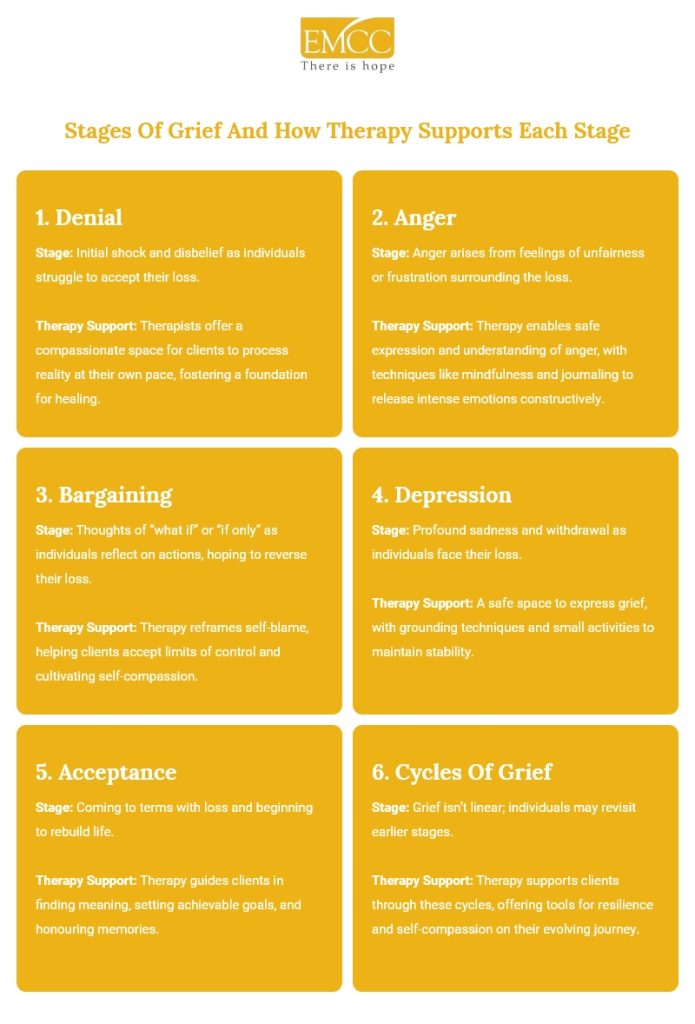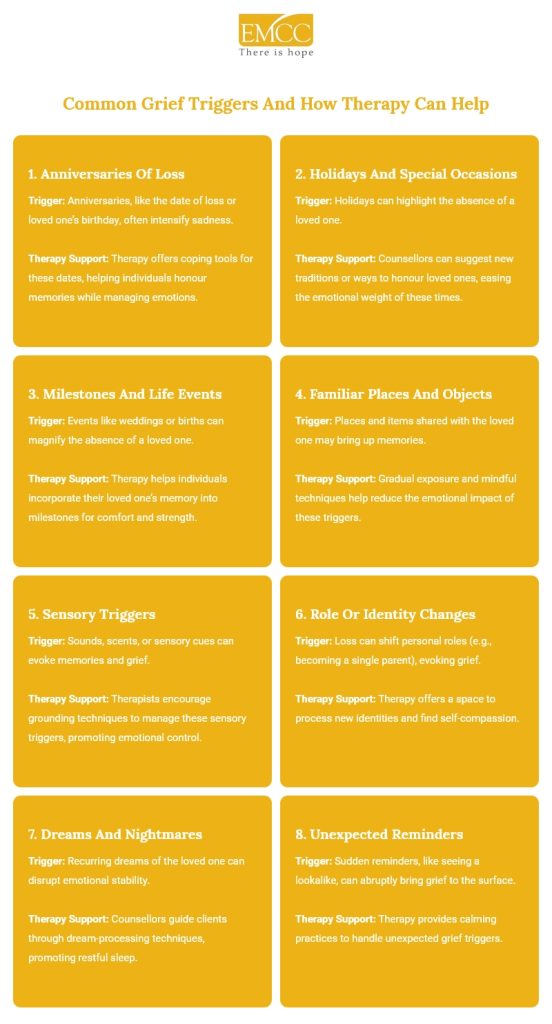
Grief is something that touches everyone at some point in life, yet it affects each person in deeply personal ways. The emotions that come with it—sadness, anger, confusion, and even moments of unexpected calm—are unique to every individual. Going through these emotions can be overwhelming, and doing so without support can make the journey even harder. That’s where -“grief therapy”, can be incredibly helpful. It provides a safe, compassionate space for individuals to process their emotions, find comfort, and work through the challenging stages of grief.
In this article, we’ll explore how grief counselling can support healing and help people move forward. We’ll discuss how therapy offers valuable tools to navigate pain while also providing connection and understanding. Whether you’re grieving the loss of a loved one, a relationship, or another significant part of life, this resource aims to guide you toward healthier ways of coping. Understanding the role of therapy can be the first step in finding peace and regaining strength for the journey ahead.
A. Understanding Grief Therapy
This specialised form of support helps individuals work through the emotional, cognitive, and physical reactions that accompany loss. Unlike general counselling, it focuses specifically on the unique journey of mourning, offering a safe and nurturing space for individuals to explore their emotions. This approach encourages the healthy expression of grief, helping people find ways to cope over time while honouring their feelings.
Purpose of Grief Therapy
The primary goal of therapy is to guide individuals toward acceptance and emotional balance. Through sessions, people are encouraged to explore difficult emotions like sadness, anger, guilt, and confusion without feeling the need to push them aside. Acknowledging these feelings is crucial, as avoiding them can delay healing and complicate the grieving process. By processing grief in a constructive way, therapy helps individuals regain a sense of stability and begin to integrate their loss into their lives, step by step.
Who Can Benefit from Grief Therapy
Therapy is beneficial for anyone facing a significant life loss. While it’s commonly associated with the death of a loved one, it’s equally valuable for those going through other major changes, such as the end of a relationship, the loss of employment or the passing of a beloved animal companion. It is especially helpful for those feeling overwhelmed by grief—whether it’s prolonged or intense—or for those struggling with unresolved emotions. No matter when the loss occurred, grief therapy offers a compassionate space to begin healing and move forward.
Impact of Unresolved Grief on Mental and Emotional Well-Being
When grief is not properly addressed, it can lead to lasting mental, emotional, and physical challenges. Unresolved grief often contributes to depression, anxiety, relationship difficulties, and even substance abuse. It can also manifest physically, causing fatigue, chronic pain, and other health problems. By addressing grief in a supportive environment, individuals can avoid these negative effects, ultimately improving their well-being and quality of life.
Importance of Professional Support through Grief and Trauma Therapy, Especially in Singapore
In Singapore, cultural stigmas around mental health may make it harder for individuals to seek help for emotional struggles. However, professional support provides a confidential, non-judgmental space where people can openly address their grief and loss. It’s particularly important to access therapists who are culturally aware and sensitive to local customs and beliefs, as this creates a foundation for effective healing. With the right support, individuals can feel truly heard and understood, helping them process their grief with self-compassion and resilience.

B. The Role of Grief Management in Healing
The loss of someone or something significant often stirs up a whirlwind of intense, sometimes overwhelming emotions. Therapy provides a safe, structured space to navigate these feelings, offering both the tools and the support needed to process them. With the guidance of a therapist, individuals can begin to articulate and understand their emotions more clearly, which is the first step toward finding acceptance. Therapists help clients explore feelings they may struggle to face alone, such as anger, sadness, or guilt, helping to unravel the emotional weight. This process fosters emotional resilience, empowering individuals to gradually move forward and embrace healing.
Discussion on the Variety of Emotions and Stages of Grief
Grief is never a simple, linear process. It’s a profoundly personal experience, and the journey through it varies from person to person. Many people encounter stages—like denial, anger, bargaining, depression, and acceptance—but they don’t necessarily follow these stages in any specific order, or even all at once. Therapy helps individuals recognise that there is no “right” way to grieve and that every person’s experience is valid. A therapist’s role is to validate each emotion and stage, providing a non-judgmental space where clients can express themselves freely. Understanding and accepting that grief has its own ebb and flow is a crucial part of healing, as it allows individuals to honour their experience without feeling rushed to “move on” or fit into a prescribed pattern.

Emphasis on Trauma-Informed Practices
Loss and trauma often go hand in hand, making it crucial for therapy to incorporate trauma-informed practices. Healing thus requires a sensitive approach, where therapy not only addresses grief but also prioritises creating a safe and secure space for individuals. With a strong focus on safety and trust, therapists can guide clients through their pain at a pace that feels right for them, always building on their strengths and resilience. This approach helps clients regain a sense of control and stability, which is essential for healing when both grief and trauma are at play.
Emphasis on Cultural Context
In Singapore, cultural expectations and social norms play a significant role in how people experience and express grief. Many may feel a strong pressure to maintain a “brave face” or keep their emotions to themselves, which can complicate the grieving process. It’s important to recognise these cultural influences in order to provide adequate support. A culturally sensitive approach respects and acknowledges an individual’s background, ensuring that therapy is aligned with their unique context. By tailoring strategies to each person’s cultural and personal needs, therapists can create a space where clients feel truly understood, respected, and empowered to process their grief in a way that feels authentic and meaningful to them.
Techniques and Approaches in Grief Therapy
Grief can bring up intense emotional and physical reactions, ranging from overwhelming sadness to anxiety or stress. Before delving into the complex emotions associated with loss, it’s vital that the therapist first ensures the individual is in a stable mental and physical state. This initial step is crucial, as someone who feels emotionally overwhelmed might struggle to process grief effectively. To support emotional regulation, therapists often introduce self-soothing counselling techniques such as deep breathing, mindfulness, and grounding exercises, which can help calm the nervous system. The focus on stabilising the person’s emotional state enables therapists to create a safer, more supportive space for deeper grief work to unfold.
Overview of Common Therapeutic Techniques in Grief Therapy
There are several therapeutic techniques commonly used in grief support, each designed to help individuals constructively navigate their emotions in a constructive and healing way.
- Cognitive-Behavioural Therapy (CBT): One of the most widely used methods, CBT helps individuals identify and challenge negative thought patterns that may arise during grief. For example, a person might feel trapped by thoughts like “I’ll never be happy again” or “I can’t cope with this loss.” CBT works by helping them reframe these thoughts, promoting a healthier, more balanced perspective. It empowers clients to regain control over how they react to their grief, moving them towards healing and acceptance.
- Expressive Arts Therapy: Sometimes, grief can be difficult to articulate with words. Expressive arts therapy offers a creative outlet for individuals to express their feelings through art, music, writing, or other forms of self-expression. This approach engages the non-verbal parts of the brain, allowing individuals to experience the emotional catharsis when emotions may be too hard to speak about. It’s particularly helpful for those who struggle to verbalise their grief or who want to explore their emotions in a more creative way.
- Narrative Therapy: Narrative therapy allows individuals to view their grief as part of their broader life story. Instead of seeing grief as a disruptive event, clients can start to integrate the experience of loss into their personal narrative. This approach helps individuals make meaning out of their grief, offering them a sense of control over their journey. It creates space for new chapters to be written, helping clients move forward while honouring their loss.
Tailored Approach to Individual Needs and Cultural Sensitivity
In a multicultural society like Singapore, where people come from a wide range of cultural backgrounds, it’s crucial for therapists to take a personalised, culturally sensitive approach. Cultural norms, traditional beliefs, and practices surrounding death and mourning can deeply shape how individuals experience and express their grief. For example, some cultures might place a strong emphasis on family and community support during times of loss, while others may encourage more private grieving or ritualistic ceremonies.
Therapists in Singapore often take the time to understand each client’s unique cultural and personal beliefs, integrating this understanding into their grief support. This may include recognising and respecting specific rites of passage, such as funeral traditions or memorial services, and ensuring these practices are honoured throughout the therapeutic process. By doing so, therapists create a safe, supportive space where clients feel seen and respected. This culturally aware approach fosters trust and helps clients feel more comfortable and understood, making the therapeutic journey more meaningful and connected.
Positive Outcomes of Grief Therapy
The therapy offers individuals vital mental, emotional, and physical support, guiding them through their healing in meaningful ways. One of the most significant benefits is the reduction in symptoms of depression and anxiety, which are often linked to the grieving process as grief may sometimes become overwhelming, leading to persistent feelings of sadness, hopelessness, and a sense of being out of control. Through therapy, individuals can learn to manage these emotions more effectively, gradually restoring a sense of emotional stability and balance.
It also equips clients with practical coping strategies, helping them navigate their grief in healthier, more adaptive ways. This may include learning stress-management techniques, developing routines for stability, or finding meaningful outlets for emotional expression. Over time, these strategies build resilience, allowing individuals to regain their ability to function in daily life. Whether it’s returning to work, reconnecting with loved ones, or simply engaging in self-care, therapy provides the tools necessary for rebuilding and moving forward.
The positive impact of therapy is well-documented. Research consistently shows that those who seek professional support experience greater reductions in grief symptoms than those who try to manage grief on their own. A study found that individuals who received therapy saw significant decreases in grief-related distress compared to those who attempted to cope without help. These findings underscore the importance of seeking support and highlight the potential for therapy to bring lasting positive changes to mental health.
Additionally, therapy helps individuals better understand the grieving process, normalising their experiences. It provides reassurance that their feelings are a natural response to loss, reducing feelings of isolation and self-blame. By working through grief in a compassionate, structured environment, clients often feel empowered to move through the stages of grief and find a sense of closure. Even as they carry the memory of their loss, therapy helps them develop a new, healthier relationship with their grief, allowing them to honour their loved ones while continuing to lead a fulfilling life.

C. Finding the Grief Therapy Right Counsellor
When seeking grief support, it’s important to find a counsellor who is qualified and experienced in handling the emotional complexities of loss. It’s a good idea to review potential counsellors’ credentials, including certifications in grief and trauma therapy. Counsellors with specialised training are better equipped to offer the tailored support you need. A strong background in mental health and an understanding of the psychological aspects of grief can also make a significant difference.
Reading reviews or seeking recommendations from trusted sources like friends, family, or medical professionals can help you find a counsellor known for their compassion and expertise. A counsellor’s reputation is a good indicator of their ability to provide effective, empathetic support. Don’t hesitate to ask questions and ensure you’re comfortable with their approach before making a decision. Finding grief counsellors who resonate with your needs can provide you with the comfort and guidance to navigate your journey.
Importance of Trust and Rapport in the Therapeutic Relationship
The success of therapy relies on building trust and rapport, especially when clients are sharing deeply personal and painful emotions. A strong, trusting connection helps individuals feel comfortable opening up about their loss, enabling the therapist to understand their needs better and provide meaningful support. The counsellor should be someone who listens attentively, without judgement, showing empathy and understanding for the client’s unique experience.
When trust is established, clients feel heard, respected, and supported throughout their healing journey. Therapy often requires vulnerability, and when individuals sense that their counsellor is truly invested in their well-being, it can make a profound difference in how they engage with the process. A compassionate, non-judgmental counsellor can guide clients through grief, empowering them to process their emotions and begin rebuilding their lives.
Creating a Safe Space for Healing
A critical aspect of therapy is creating a safe healing environment where individuals can process their emotions without fear of judgement. This space should feel secure, calming, and free from distractions—allowing clients to explore their grief at their own pace. Feeling secure and supported during this time enables individuals to confront their deepest emotional wounds, knowing they will be met with compassion and understanding.
Emotional and psychological security is just as important as physical comfort in a therapeutic setting. When clients feel safe expressing their grief, they are more likely to engage openly and gain deeper insights into their emotions. This emotional safety is vital for developing healthy coping strategies and fostering a sense of empowerment in managing grief.
Respect for Confidentiality in Grief Therapy
Confidentiality is a fundamental aspect of therapy. Clients need to feel confident that their personal experiences and emotions will remain private, which builds trust and security in the process. When individuals know their information is protected, they are more likely to be open and honest, which is crucial for progress. Along with confidentiality, respect plays a vital role. A compassionate counsellor honours each client’s unique emotional journey, showing empathy and understanding for their pain. This respect creates a therapeutic environment where clients feel valued, supported, and empowered to heal.

Long-term Strategies for Managing Grief
While therapy can be transformative, it’s important to understand that grief doesn’t follow a set timeline, and healing is often a long-term journey. For many, therapy is just one part of that process. Ongoing support, whether through follow-up sessions or support groups, can help individuals continue their healing and manage new challenges as they arise.
Grief support doesn’t end when therapy sessions conclude. Staying connected with a therapist or joining a support group helps maintain the healing momentum and builds a network of individuals who understand the pain of loss. Support groups, in particular, offer a sense of community, helping individuals cope with anniversaries or triggers and preventing prolonged grief symptoms. Long-term grief management is about creating a sustainable path to healing, with continued support to navigate the complexities of grief.
Ways to Integrate Grief Management into Daily Life
Incorporating grief management techniques into daily life is crucial for long-term healing. Self-regulating practices like mindfulness, deep breathing, and journaling can help individuals stay connected to their healing journey even outside of therapy. These techniques allow for real-time processing of emotions and help maintain emotional balance while navigating life after loss.
In addition to self-care practices, engaging in activities that honour a loved one’s memory can also play an important role in healing. Simple rituals like lighting a candle, visiting a meaningful place, or creating a memory book provide a sense of connection and meaning. These acts of remembrance allow individuals to process grief while celebrating the life of what they’ve lost. By weaving grief management into daily routines, individuals nurture their emotional health, gradually restoring hope and balance as they heal.

Frequently Asked Questions on Grief Therapy
Here are the answers to some of the questions you might have about bereavement counselling.
1. What can I expect during my first grief therapy session?
During your first therapy session, your counsellor will likely focus on understanding your loss and what brought you to therapy. It’s an opportunity for you and your therapist to get to know each other and build rapport. The therapist will ask about your personal history, current emotions, and any specific concerns, while also explaining the therapy process, confidentiality, and what to expect moving forward. It’s a space for you to ask questions and express any worries you may have.
2. How long does grief therapy typically last?
The length of therapy depends on your individual needs and the complexity of your grief. Some people may find relief after a few sessions, while others may need longer-term support over several months. Sessions are often held weekly or bi-weekly at the start, with the frequency adjusting based on your progress and goals.
3. Can grief therapy help with other mental health issues that arise from grief?
Yes, therapy can address mental health concerns like anxiety and depression that often arise alongside grief. The therapist can help identify and manage these symptoms, offering a holistic approach that promotes both emotional healing and overall mental well-being.

Grief is a deeply personal and sometimes overwhelming experience, but therapy provides the support needed to navigate it. In a safe and nurturing environment, therapy helps individuals process emotions, understand their grief, and move toward healing. With the right support, individuals can develop healthy coping strategies to manage grief constructively and with empowerment.
Whether you’re navigating the initial shock of loss or coping with the long-term effects of grief, professional counselling can play a vital role in building resilience and emotional well-being. It helps you rebuild your life, restore hope, and regain your inner strength.
If you or someone you know is struggling with grief, don’t hesitate to seek support. At Eagles Mediation & Counselling Centre, we are here to walk alongside you on your healing journey. Our experienced, compassionate counsellors provide person-centred care tailored to your unique needs.
Make an appointment with us today to discover how we can help you regain hope, emotional balance, and strength. Let us support you through this difficult time, empowering you to heal and move forward with confidence.

